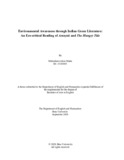| dc.contributor.advisor | Saba, Anika | |
| dc.contributor.author | Maria, Mahzabeen Alam | |
| dc.date.accessioned | 2022-09-19T06:02:10Z | |
| dc.date.available | 2022-09-19T06:02:10Z | |
| dc.date.copyright | 2020 | |
| dc.date.issued | 2020-09 | |
| dc.identifier.other | ID 15103055 | |
| dc.identifier.uri | http://hdl.handle.net/10361/17233 | |
| dc.description | This thesis is submitted in partial fulfillment of the requirements for the degree of Bachelor of Arts in English, 2022. | en_US |
| dc.description | Cataloged from PDF version of thesis. | |
| dc.description | Includes bibliographical references (pages 43-44). | |
| dc.description.abstract | The aim of this thesis is to examine the developing literary theory of ecocriticism on two chosen
Indian green literary texts; Bibhutubhushan’s Aranyak and Ghosh’s The Hungry Tide. The theory
of ecocriticism is still going under development which means it is still evolving and exploring by
various environmentalists and eco-critics. Its main goal is to explore the environment and nature
through the portrayal of literature, especially environmental texts. By doing so, it examines the
nature, environment which includes both the humans and nonhumans; lives and relationships
between human-nature, and human-animal, and the environmental issues we are dealing with day
by day along with providing possible solutions. It emphasizes one main conflict of
anthropocentrism vs. biocentrism; where the environmentalists and eco-critics tends to blame the
anthropocentric views as a cause to imbalance the ecosystems and all the environmental crises,
and focuses on the biocentric views. Regarding it, several naturalists have come out with
environmental ethics such as land ethics, bioethics which mainly calls for a biocentric
understanding and mix of both the anthropocentric and biocentric views for the “common good”
of all, and all such can be seen through the stories of these two selected novels. In this thesis, I
am going to imply ecocriticism in these two chosen texts by discussing environmental issues and
ethics by exploring mainly the human-nature relationship in Aranyak and man-animal
relationship in The Hungry Tide. | en_US |
| dc.description.statementofresponsibility | Mahzabeen Alam Maria | |
| dc.format.extent | 44 pages | |
| dc.language.iso | en | en_US |
| dc.publisher | Brac University | en_US |
| dc.rights | Brac University theses are protected by copyright. They may be viewed from this source for any purpose, but reproduction or distribution in any format is prohibited without written permission. | |
| dc.subject | Ecocriticism | en_US |
| dc.subject | Biotic | en_US |
| dc.subject | Anthropocentric | en_US |
| dc.subject | Nature | en_US |
| dc.subject | Environment | en_US |
| dc.subject | Bioethics | en_US |
| dc.subject.lcsh | Ecological disturbances | |
| dc.subject.lcsh | Human ecology | |
| dc.subject.lcsh | Asia--Sundarbans | |
| dc.subject.lcsh | Deforestation | |
| dc.title | Environmental awareness through Indian green literature: an eco-critical reading of Aranyak and The Hungry Tide | en_US |
| dc.type | Thesis | en_US |
| dc.contributor.department | Department of English and Humanities, Brac University | |
| dc.description.degree | B.A. in English | |

